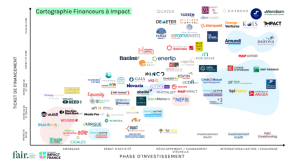
Evolution of fundraising in impact startups
In 2020: deals by so-called impact companies accounted for “only” 8% of the total amount raised in France, at the same level as in 2019. At that time, 5 companies were in the top 15. These were Ynsect, Innovafeed (both insect proteins), McPhy (hydrogen), Back Market (refurbished digital products) and Aledia (3D LEDs).
In 2021: deals involving impact companies will drop to just 5% of the total amount raised. This can be explained in part by the presence of only 2 companies in the top 15. Back Market (again) and Vestiaire Collective (second-hand clothing website). At the same time, a number of digital deals soared to well over 100 million euros. These “off-the-beaten-track” fund-raisings are enabling digital to mechanically increase its share of the total amount raised.
2022: marks a real acceleration in investments in impact startups. Deals reach 22% of the total amount raised. And this acceleration is reflected in the top 15 deals with 9 (Ecovadis, Back Market, Innovafeed, Zeplug, Electra, Bump, Verkor, NW Group, Deepki).
2023: although the year is not over yet, we can already point to a few trends. In mid-September, 30% of deals had an impact component (in terms of number of deals). This percentage has even risen to 38% (in terms of amounts raised).
All sectors are involved: fashion (Faguo), recycling (b:bot), energy (Hype), e-commerce (Omie & Cie), materials (Voodoo), mobility (Zeway), aeronautics (Ascendance Flight Technologies), tourism (Eklo hotels), fintech (Green Got) but also and above all agritech, recycling/second-hand and all energy-related subjects (battery, recharging, hydrogen…).
Impact investment funds
This trend in the number of funds raised and the total amount raised by impact companies has paralleled the rise in the number and power of impact funds and “traditional” VC funds that include a “dose” of impact in their investment thesis. Other players, such as business angels and certain crowd equity platforms, also make impact a condition of investment.
Unlike a “traditional” VC fund, an impact fund will only invest in start-ups with a quantifiable impact. The impact can be societal or environmental.
Impact funds combine financial profitability and impact, and look for 3 main criteria:
– real social or environmental impact
– direct impact for customers (not induced)
– impact measurement based on results and continuous evaluation monitoring
In November 2022, Mouvement Impact France counted 60 investment funds with €4 billion in assets under management in France, compared with $715 billion worldwide in 2020.

Mapping des financeurs à Impact du Mouvement Impact France et de FAIR (ex Finansol). Nov 2022
So can you raise money from investors if your startup isn’t impact-driven?
While impact startups are on the rise, 70% of deals don’t have an impact component.
So what other themes do investors “prefer”?
Unsurprisingly, we find AI, which includes all sectors (agritech, insurtech, adtech…) and above all medtech.
But the sector that raised the most in 2023 was HR tools, with a very wide range of themes (ATS, variable compensation management, employee mobility passes, video games for well-being at work, mental health platforms, collaborative software, etc.).
Just behind them are cybersecurity/security, ecommerce/marketplace, fintech, foodtech, agritech, web3 (including NFT) and adtech, with almost identical numbers raised.
The big absents in 2023: silvertech, legaltech and 3D.
